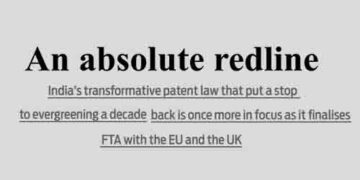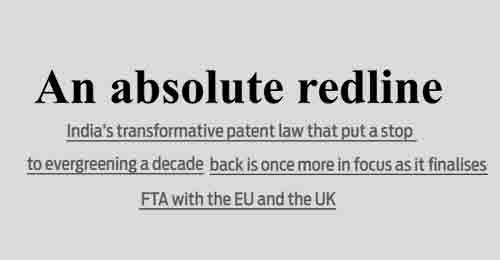 A DECADE back, the Supreme Court delivered a 112-page landmark judgment and helped many other countries in Africa, Latin America and even Europe and America re-examine their laws on patents. In a unanimous and unambiguous verdict, the honourable judges dismissed the appeal by global pharma giant Novartis AG, which was battling the rejection of its patent for a lifesaving cancer drug sold under the brand name Glivec.
A DECADE back, the Supreme Court delivered a 112-page landmark judgment and helped many other countries in Africa, Latin America and even Europe and America re-examine their laws on patents. In a unanimous and unambiguous verdict, the honourable judges dismissed the appeal by global pharma giant Novartis AG, which was battling the rejection of its patent for a lifesaving cancer drug sold under the brand name Glivec.
Reporting on the. case, the magazine Down to Earth said: `The case centres on Glivec (imatinib mesylate), described as the “magic bullet” to cure cancer. It is expensive, prohibitively so by Indian standards, at Rs 1,20,000 per patient per month, and its patent application was contested by the Cancer Patients Aid Association (CPAA) and a clutch of generic companies manufacturing the drug in India, all of whom filed pregrant opposition to Novartis’s patent application. While the patients’ group cited accessibility issues because of the cost, the generic companies disputed the novelty of imatinib mesylate.’’
A pivotal test
Patent laws were applied in India post2005 although Novartis had applied for a patent for the drug way back in 1998.
It turned out to be a pivotal test of the country’s special laws preventing the ‘evergreening’ of drugs. As Down to Earth reported: “The multinational’s initial case became a cause célèbre with health activists and patient groups also taking to the streets on the issue of affordable health care. Indian generic manufacturers were then selling their version of the cancer drug at Rs 8,000- Rs 10,000 per patient per month. The legal aspects of this case were of supreme significance for the country—and for the rest of the world that was dependent on inexpensive generic medicines from the “world’s pharmacy” as India is known.’’
The opposition was not just because the generic form of the drug was sold at less than 10 per cent of what Novartis was offering it to patients, but also because of the patently unfair practice of evergreening that multinational pharma giants were indulging in – essentially what they were doing was to slightly modify the combination of salts and apply for a fresh patent. Their argument being the modified version was a bonafide new drug.
Clever subterfuge
The fact, though, was that it was a clever subterfuge to ‘evergreen’ — the practice by which pharma companies try to extend and retain the patent life of a drug (usually 20 years) by making minor adjustments to existing medicine that is specifically barred by a section of India’s Patent Act, 2005 –and keep on making millions of dollars at the expense of poor cancer patients.
Reporting on it years after the judgment, Health Policy Watch said: ‘’Novartis had fought a long and bitter battle over several years, hiring some of India’s most eminent lawyers, but at the end, India’s Supreme Court rejected the company’s final appeal for a patent on imatinib mesylate (Glivec) that treats chronic myeloid leukaemia (CML)…years after Novartis’ challenge to India’s antievergreening safeguard — Section 3(d)– was struck down by India’s Supreme Court, it is time for stock-taking. Clearly, the famous clause in India’s patent law, aimed at preventing ‘evergreening’ or not allowing patents on new forms of existing medicines unless they demonstrate a significant increase in efficacy, remains a thorny issue, admired and hated equally.’’
India won’t budge
The website was right in its assessment, the issue has come to the fore a decade later when India is on the verge of finalising its free trade talks with the EU and UK. Last week all major newspapers reported that the country had “firmly communicated” that it was, as the Mint reported, ‘’unlikely to budge from its opposition to the provisions on regulatory data protection and patent extension in free trade talks with the EU and the UK, it has told its negotiating partners, in a move aimed at protecting its generic drug industry and healthcare schemes.’’
It is the right stand. After all as the largest provider of generic drugs to the world—a fifth of the global supply—this low cost translates into it being close to 80 per cent of the Indian pharma market. Also, the respected British medical journal,The Lancet, has outlined that such a clause would not just be damaging for India but for the UK as well considering that the ‘’the UK’s National Health Service (NHS), as the Indian bulk drug industry accounts for a quarter of the price-controlled medicines in the UK.
‘’Of course, they are lifesavers for most countries in Africa, South East Asia and Latin America and get a bulk of their requirements from India’s generic drugs.
It is an absolute red line. And one of the great advantages of being a powerful economy is the ability to negotiate from a position of strength.
















